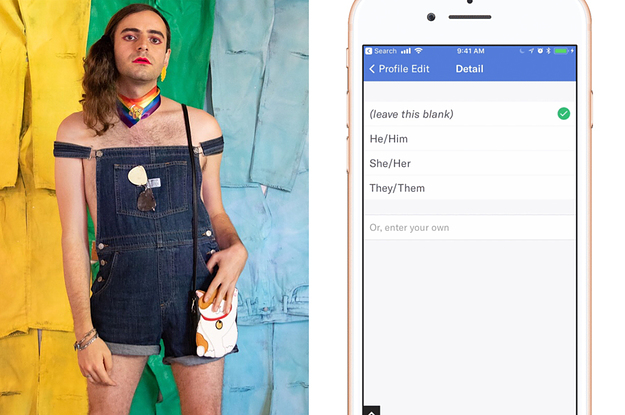
Never am I made to feel more demanding or needy or extra than when I dare to correct people who use the wrong pronouns. I use the gender neutral pronouns “they/them” because “he/him” just doesn’t feel right. According to many, this makes me a difficult person. When someone refers to me as “he” and I let that person know that I actually prefer the gender neutral pronoun “they,” it almost always makes things awkward.
No matter how chill I am when I correct people, they’re always worried that they’ve hurt me deeply by using the wrong pronoun. I’m rarely hurt when someone uses the wrong pronoun; most of the time it’s just an honest mistake. But I am hurt when, after I’ve corrected someone, they choose to become defensive or awkward about the whole thing.
So yeah, correcting someone who misgenders me is often uncomfortable. But correcting someone attractive and charming and interesting and cute who misgenders me on a first date can be almost unbearable.
Think about it. You meet someone new at a cute bar or restaurant. You didn’t think it was possible, but he’s somehow even sexier in person than he appeared online. The attraction is instant. The conversation is flowing. Then, out of the blue, he references you in third person for the first time to the waiter. It’s innocent, but glaring. Despite the fact that you’re wearing a cute dress and lipstick, it just comes out. “He’ll have the martini,” or “He’s going to have the pasta.”
So, even though you don’t really want to, you correct him then and there. You tell him that you use gender-neutral pronouns. And though he swears he’s chill about it, it still makes things weird. The air gets sucked out of the room. Any momentum that you may have had halts in its tracks. You get through the rest of the date alright, but when you say goodbye, you can already tell that he’s gonna ghost, that you’re “too complicated” and this thing that could have maybe gone somewhere is now going nowhere all because of a stupid pronoun mix-up.
Ever since I began identifying as non-binary, this scenario has played out over and over again during the course of my dating life. And oh boy am I ever sick of it.
It’s even more revolutionary than it sounds. Beyond the obvious – that this will help people like me avoid getting misgendered on first dates – this small change does something more. It upends the tired notion that gender nonconforming people like me are being “too demanding” by asking the world to accommodate our identities.
OkCupid is sending the important message that people like me are valid; that asking romantic partners to respect pronouns from the first date is not an egregious expectation. Non-binary people like me are no longer asking too much. We are simply asking for what all people deserve: a respectful dating culture free from gender stereotypes.
It’s a needed fix, because the gender binary has really messed up dating culture. Since I was a kid, I've been inundated with talk about "what girls want," and "what guys like," but those conversations always center around the idea that guys want the same thing, that women are, more or less, similar.
I know that in our hyper-informed digital world this probably isn't an earth-shattering idea, but it bears repeating: all guys are not the same. All girls are not the same. No matter how similar they may appear, no two guys or two girls want the same thing out of a first date or out of a relationship. The gender binary, the idea that people are sortable into one of two gender categories, is flawed to begin with.
The lie that the gender binary tells you is this: if you know someone’s gender, you can then safely assume a lot of other things about them. If you know that someone is male, the gender binary would tell you that you can assume what *his* goals are in life, what *he* enjoys doing in bed, what clothes *he* enjoys wearing, what size spoon *he’d* like to be, and what pronouns *he* prefers.
If you know that someone is female, the gender binary suggests that you also know how *she* would like to be treated, whether or not *she’ll* pay for dinner, what sorts of gifts *she’d* like on your anniversary, how *she* prefers to dress, and what pronouns *she* uses. The moment we know someone’s gender, we assume so much else about them. And that’s fucked.
Here’s the truth: knowing someone’s gender or sex tells you hardly anything about who they are. Knowing that someone identifies as a woman or man or genderqueer or trans gives you very little useful information to go off of. Knowing whether someone was assigned male or female at birth tells you basically nothing about what they’re passionate about.
Want to know what music someone’s into? You have to ask. Want to know whether someone prefers being big spoon or little spoon? You have to ask. Want to know whether someone enjoys sports? You have to ask. Want to know how someone feels about paying for dinner or opening doors for you? You have to ask.
Or, in the case of OkCupid, you can start by simply reading their profile. OkCupid profiles have a reputation for being wonderfully detailed across countless dimensions (pronouns now included), which makes the work of getting to know somebody a whole lot easier.
from As/Is https://ift.tt/2IhxRjL
沒有留言:
張貼留言